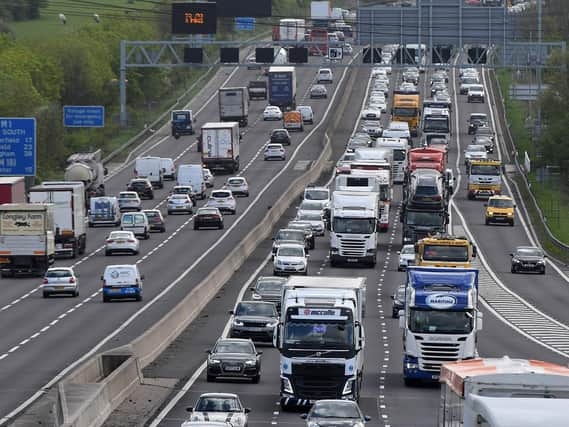Plea for Government rethink after serious and fatal crashes increase on M1 'smart motorways' in Yorkshire


Internal analysis for National Highways, the new name for Highways England, has found a southern stretch of the M1 is on course to deliver a £225m hit to the economy rather than an expected £1bn boost after journey times proved to be slower than expected.
National Highways is aiming to convert all ‘dynamic’ sections of motorway – where the hard shoulder is opened to traffic at busy times – into permanent all lane running motorways with no hard shoulder by March 2025.
Advertisement
Hide AdAdvertisement
Hide AdMs Champion said that while the economic case for this is now in question, the experience of South Yorkshire with an all-lane running smart motorway highlights important safety concerns.
“South Yorkshire has been not the guinea pig but the sacrificial lamb proving how deadly all-lane running motorways are,” she said.
In June 2019, Jason Mercer, 44, and Alexandru Murgeanu, 22, both died after a collision between their vehicles near Sheffield on the M1. After getting out of their cars to exchange details, they were both hit by a lorry. At an inquest, coroner David Urpeth said smart motorways without a hard shoulder carry “an ongoing risk of future deaths”.
In February this year, South Yorkshire coroner Nicola Mundy said Highways England should be investigated over possible manslaughter charges after Nargis Begum, 62, from Sheffield, was killed after her car broke down on part of the M1 with no hard shoulder.
Advertisement
Hide AdAdvertisement
Hide AdHer car was subsequently hit by another vehicle 16 minutes after her Nissan broke down near Woodall Services but it took a further six minutes before warning signs were activated.
A recent National Highways report said smart motorways are safer than other roads but admitted concerns have been raised about multiple collisions between Junctions 30 and 35 in South Yorkshire and also between Junctions 39 and 42 near Wakefield.
A review of the South Yorkshire section found the average number of collisions have decreased due to a fall in the number of slight injury collisions – but found the number of serious injury collisions have gone up and that crashes resulting in deaths “have increased from one in three years to three in three years for the Junction 32 to Junction 35 section”.
The report said: “Accordingly, the ratio of fatal and serious injury collisions has increased. Collision cluster locations were identified between Woodall motorway service area and Junction 31, between Junction 31 and Junction 32, and on the northbound approach to Junction 33.”
Advertisement
Hide AdAdvertisement
Hide AdFor Junctions 39 to 42, the review found that while the scheme has significantly reduced congestion despite a considerable increase in daily traffic, the number of collisions per year has increased. It said: “A small rise in collisions of serious-injury severity has been noted scheme-wide and a cluster site at and to the north of Junction 39 has been determined.”
Last week, a review by regulator the Office of Road and Rail of a report that claimed smart motorways were at least as safe as conventional motorways found no errors in the calculations.
The regulator, the Office of Rail and Road (ORR), said all the available data was used in the “stocktake” of the Department for Transport (DfT) published in March last year.
But the ORR did note that “there is a limited amount of data available”. Only 29 miles of motorways with the hard shoulder removed have five years of safety figures.
Advertisement
Hide AdAdvertisement
Hide AdThe ORR made a series of recommendations to National Highways, the Government-owned company responsible for motorways and major A-roads in England.
They include a recommendation that National Highways works with motor insurers to get access to information regarding no-injury crashes on smart motorways, and that it uses a smaller number of metrics to communicate safety data.
Transport Secretary Grant Shapps said: “The report supports National Highways’ findings that smart motorways are the safest roads in the country in terms of fatalities.”
The AA’s president Edmund King is among those to question the use of smart motorways. He said the AA believes “controlled motorways with a hard shoulder are the safest option” and where that is not the case, more emergency lay-bys should be installed to help safety and driver confidence.
Police continue investigation into M1 deaths
Advertisement
Hide AdAdvertisement
Hide AdPolice investigations into the three deaths on the South Yorkshire section of M1 ‘smart motorway’ are continuing, the force said today.
“South Yorkshire Police has now obtained all evidence the coroners had reference to at the inquests into the deaths of Mr Jason Mercer, Mr Alexandru Murgeanu and Mrs Nargis Begum,” a spokesperson said.
“A Senior Investigating Officer has been assigned to this matter, and is overseeing the review of all the materials obtained.
“This activity will allow SYP to ascertain whether a crime has been committed, with a view to the possible commencement of criminal proceedings.
Advertisement
Hide AdAdvertisement
Hide Ad“SYP remains in close consultation with the Crown Prosecution Services and the Health and Safety Executive.”
Support The Yorkshire Post and become a subscriber today. Your subscription will help us to continue to bring quality news to the people of Yorkshire. In return, you'll see fewer ads on site, get free access to our app and receive exclusive members-only offers. Click here to subscribe.
Comment Guidelines
National World encourages reader discussion on our stories. User feedback, insights and back-and-forth exchanges add a rich layer of context to reporting. Please review our Community Guidelines before commenting.